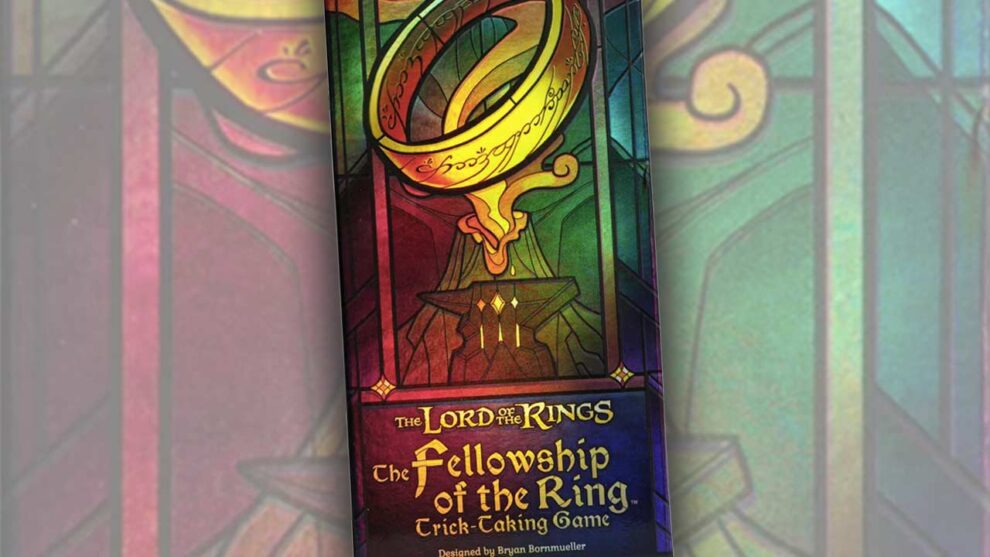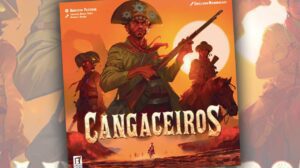Disclosure: Meeple Mountain received a free copy of this product in exchange for an honest, unbiased review. This review is not intended to be an endorsement.
I’d like to take a moment to address the uncomfortable prosody of the title. The Fellowship of the Ring: Trick-Taking Game is, at the very least, guilty of dropping a “The,” is it not? There’s something about the way “Trick-Taking Game” is thrown in there, with a lack of propriety that brings nothing to mind so much as the words “Cheese Product,” that feels off. The Fellowship of the Ring: The Trick-Taking Game feels better.
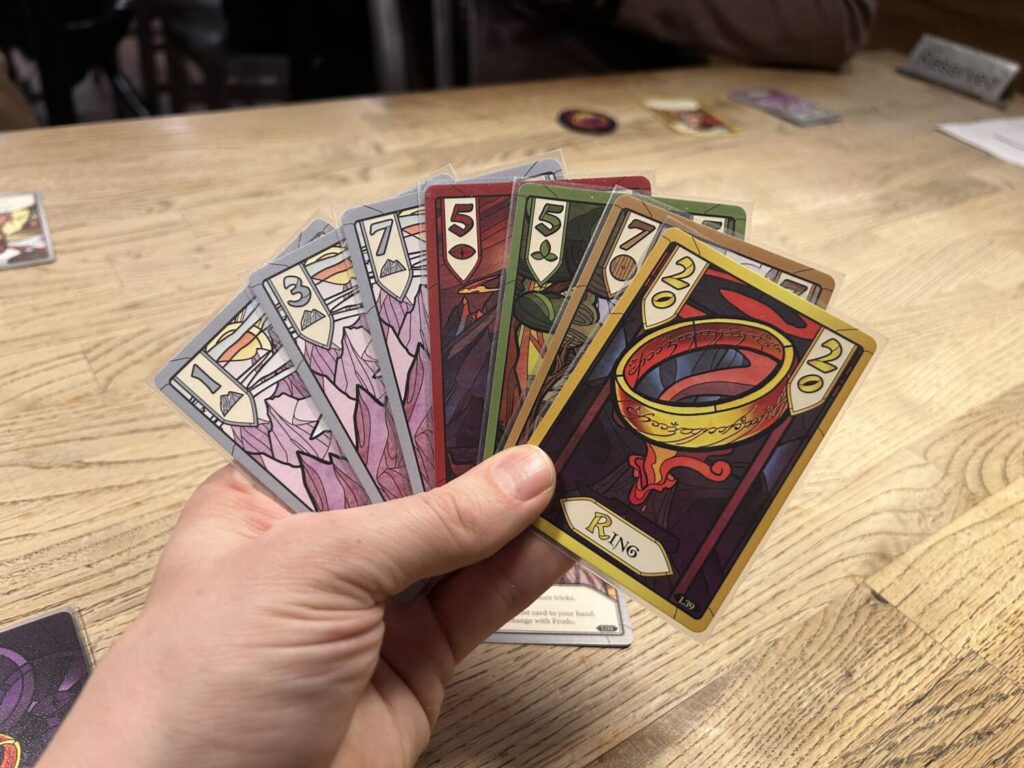
I’m Not Stalling, You’re Stalling
The Fellowship of the Ring: Trick-Taking Game is a cooperative card game, very much in the same spirit as The Crew. Designer Bryan Bornmueller seems to have drawn particular inspiration from the second installment, Mission Deep Sea, which has a wider variety of mission types than The Quest for Planet Nine. Each chapter of Fellowship provides the players with a variety of characters to choose from, each of whom has a specific victory condition that must be met in order for the team to succeed.
In Chapter 1, for example, the players are presented with a choice of Frodo, Bilbo, Gandalf, and Pippin. Frodo needs to win a specified number of Ring cards, one of the five suits in the deck. Bilbo needs to win at least three tricks, Gandalf needs to win at least one, and Pippin needs to win the fewest tricks. The player who is dealt the 1 of Rings takes Frodo, and the other players choose in turn order.
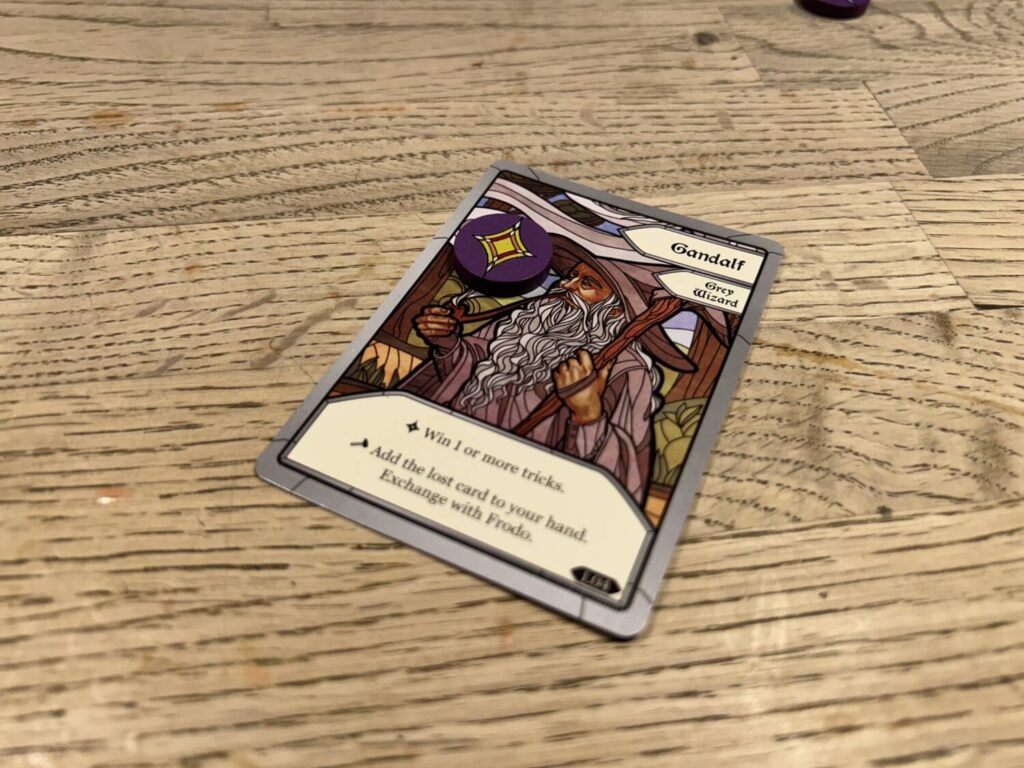
The early scenarios are fairly straightforward, but the game introduces dozens of characters as you proceed through each of its 18 chapters. While I think “spoilers” is a bit of a stretch here, I will preserve the sense of surprise for those who proceed. Suffice it to say that the Lord of the Rings aficionados among you will be well and truly tickled by the characters who show up.
And my, do those characters look good. Elaine Ryan and Samuel R. Shimota went with a charming stained glass motif, which reinforces the storybook feel of the whole thing. They drew up a whole mess of hotties, too. The bone structure on some of these guys could cut, well, glass. Between the gorgeous art and the clean gameplay, I came out of the gate pretty hot on The Fellowship of the Ring: Trick-Taking Game. Then I kept playing it.
I’m so tired. And the Ring is so heavy, Sam.
I couldn’t stop playing Fellowship. I needed to finish it. Often, and ideally, the wish to play a game over and over again or to completion is driven by enjoyment. The game keeps revealing more to you, unexpected details and decisions shine through, new strategies arise, etc. With Fellowship, though, I had the opposite experience. My first play was so enjoyable that we completed eight chapters in a single sitting. The next time I sat down to play with a new group, I found myself feeling a bit bored. A third play of the first few chapters confirmed for me that it didn’t hold up particularly well to repetition. What had felt charming and fresh on first play had become flat.
I’ve spent a lot of time now trying to figure out why that is. It’s not the simplicity. I’ve replayed the first several missions from both The Crews numerous times, and while I much prefer more challenging later missions, those early ones still light a spark. Rather, the issue is the prescriptive nature of early Fellowship chapters. The first chapter, which I described above, always plays out the same way. Frodo always has the only trump card in the game in his hand, so you know getting him his rings will be easy. The player with the weakest hand chooses Pippin, the player with the strongest hand chooses Bilbo, and Gandalf will safely be able to take one.
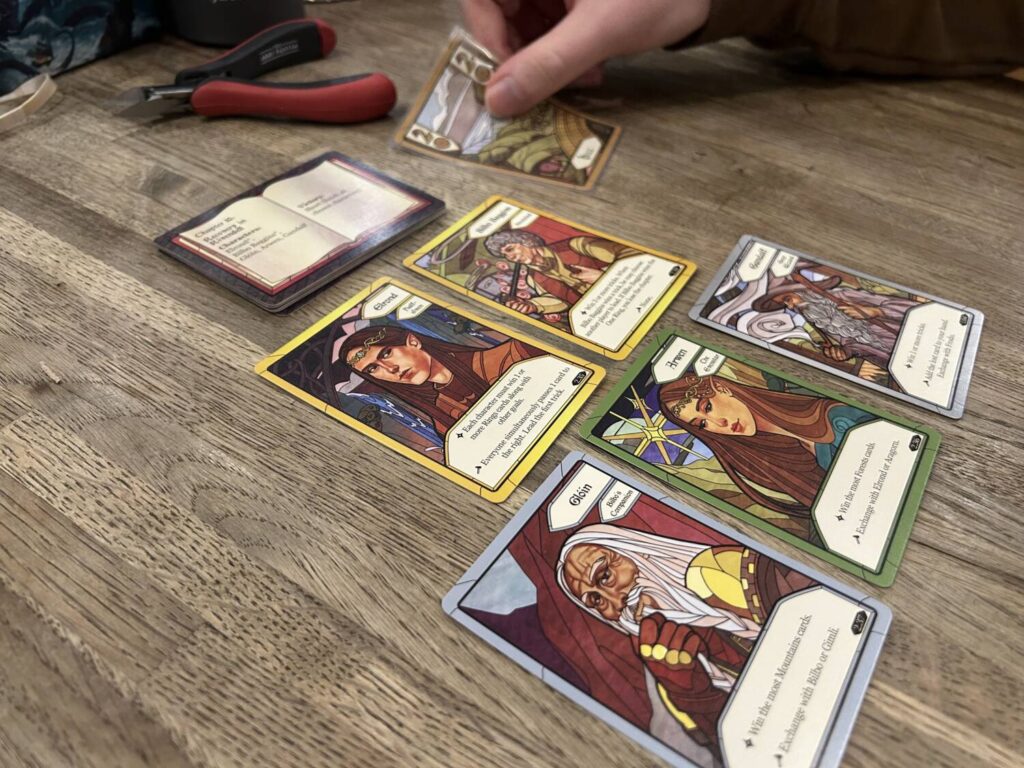
Compare this to the first mission of The Crew, where the goal is even simpler, but the gameplay is significantly richer. For those who haven’t played The Crew: The Quest for Planet Nine, the first mission requires the Commander—directly analogous to Frodo, in that the Commander starts with the most powerful card in their hand—to win a specific card from the deck. That card could be any number, from the pink 1 to the yellow 9. It can happen, and occasionally does, that the Commander has the perfect card in their hand to lead with the 9 of that suit and immediately complete the mission. If that happens, everyone chuckles and you move on to the next one.
But what if the Commander doesn’t have that card? What if they need to win the green 7 and their highest card on-suit is the green 5? Then it starts to get more difficult, and more interesting. The Commander will need to short suit either themselves or everyone else, in the hopes that someone can feed them that 7 as an off-suit card. They could lead with the trump card, but that may not work. Provided things don’t work out perfectly, you can figure out a number of clever ways to solve your problem. That is what makes The Crew so great.
Fellowship does not allow for clever ways to solve your problems. Most rounds start with a small amount of passing between players, which can help, but the real “puzzle” of Fellowship is choosing the right character to match the hand you’ve been dealt, rather than figuring out how to make the hand you’ve been dealt work for the situation. It’s a small but meaningful distinction, one that makes an enormous difference for gameplay, and only becomes more meaningful as you move into the later chapters.
Consider my experience with Chapter 12. I played and failed that chapter six or seven times over three days with three different groups of players. Even playing in a group with two of the best trick-taking players I know—and I know some very good trick-taking players—we could not get it. You have to play nearly trick-perfect. After four failed attempts, the last group decided to try it once with open hands. We ended up being dealt ideal hands for completing the chapter, and were able to breeze through it.
“That just means it’s challenging,” my partner commented when I related this to her. I disagree. Challenges feel satisfying, even in failure. You can feel yourself improving and getting closer, making better and better decisions. Not so with Chapter 12, nor many of the later chapters in The Fellowship of the Ring. We had fun trying, but we were having fun in spite of the game, not because of it. One of my friends noted, “There are opportunities for mis-plays, but not for inspired ones.” This brings us to the crux of the issue, the way in which Fellowship falls short in comparison to The Crew: it lacks the ability to communicate information to your teammates.
Once per hand in The Crew, you are able to take a card and put it on the table for everyone else to see. It is, without exaggeration, one of the greatest game design accomplishments of the last 20 or 30 years. The ability to communicate in The Crew creates a rich meta-game. The right communication choices can turn a horrendous hand into something salvageable. Complex missions are achieved not through dumb luck or fait accompli, but through collective decision-making. Communication is what gives The Crew its unique texture, and allows for players to feel accomplished. If you “say” the right thing at just the right time, you’re a hero.
You don’t get that in The Fellowship of the Ring: Trick-Taking Game. By and large, especially in the later chapters, the hands are either there or they aren’t. Some missions have fun combinations of goals. My favorite required three of the four players to win particular cards in the same suit. It’s a fun idea. The promise of that idea is let down, in my opinion, because your ability to pull it off is frequently down to luck rather than keen playing.
Bornmueller clearly loves The Lord of the Rings, and has put a lot of clever and careful work into infusing theme and setting into the mechanics of the game. The art, as I said, is beautiful. Nevertheless, as a game, Fellowship largely misses the mark. Later scenarios are frustrating rather than challenging, or even overwhelming. The game is missing the flexibility and dynamism that make its clearest antecedents so wonderful.
I did not have a bad time playing Fellowship, but it is certainly true that this is a game where most of the enjoyment came from what surrounded the game rather than what came from within it. The Lord of the Rings lovers in your life will be happy to play this. For everyone else, can I interest you in a few hands of The Crew?


